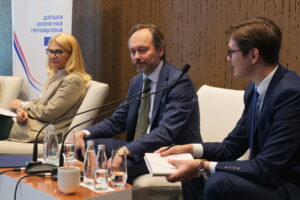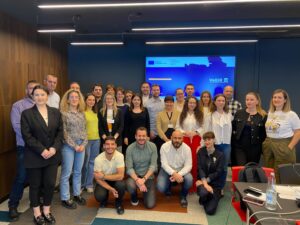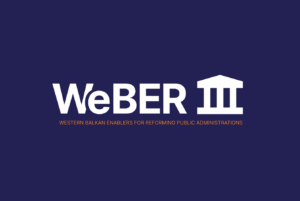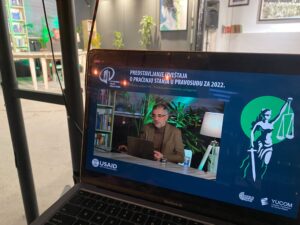Headquarters: Svetog Nauma 7, 11000
Office address: Đorđa Vajferta 13, 11000
Phone:: +381 11 4529 323
From Hungary to Poland: New Institutional Cycle, Renewed Ambitions
Belgarde, 13 December 2024 – As we approach the end of Hungary’s semester at the head of the Council of the EU, the seventeenth edition of our panel discussion From Hungary to Poland: New Institutional Cycle, Renewed Ambitions was held, to reflect on the Presidency’s achievements, as well as look at its future Polish leadership. The event was jointly organised at the Europe House by the European Policy Centre (CEP) and the Delegation of the European Union in Serbia. During this time, a diverse group of panelists shared their insights. More specifically, the panel included H.E. Emanuele Giaufret, Ambassador and Head of the EU Delegation to the Republic of Serbia, H.E. Jozsef Zoltan Magyar, Ambassador of the Republic of Hungary to the Republic of Serbia, Mrs. Kamilla Duda-Kawecka, Chargé d’affaires a.i. at the Embassy of the Republic of Poland, Mr. Miroslav Gačević, Acting Assistant Minister at Serbia’s Minister of European Integration, and Milena Mihajlović Denić, Programme Director, European Policy Centre (CEP). The panel was moderated by Strahinja Subotić, Programme Manager and Senior Researcher at CEP.
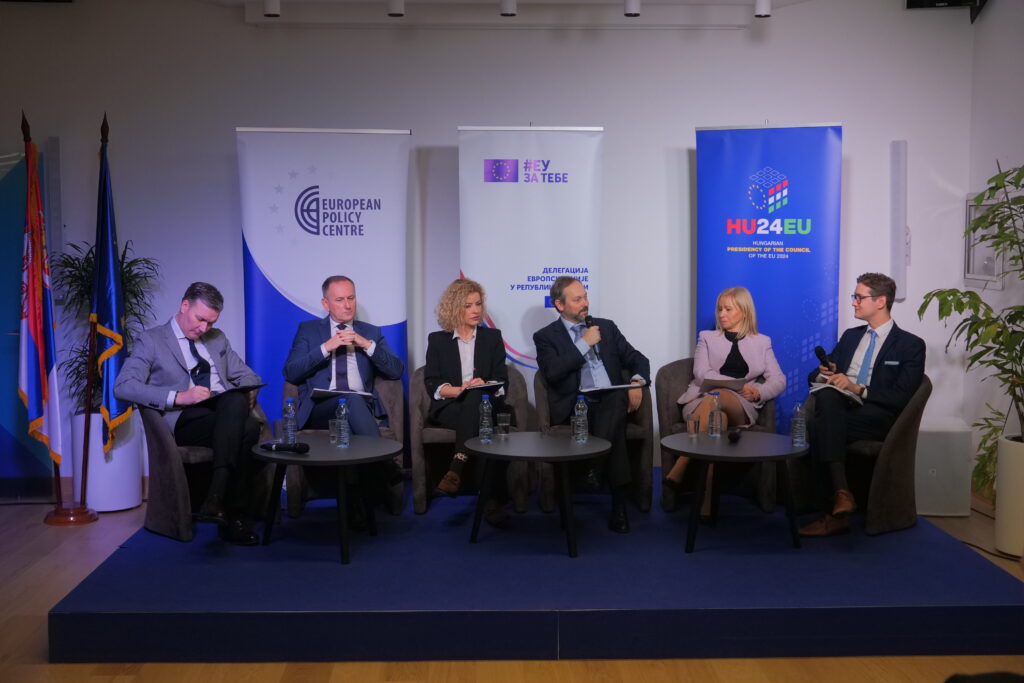
The discussion began by reflecting on the current state of the European Union amidst global geopolitical challenges. As noted by Ambassador Giaufret, these issues are apparent. However, rather than perceiving them as insurmountable obstacles, the Union and its citizens should embrace them as an opportunity to make the right decisions and positively shape present and future eras. Moreover, Ambassador Giaufret acknowledged that the EU is also achieving important results, regarding its unwavering support to Ukraine and commitment to its security policy and role in the NATO alliance. Ambassador Giaufret further explained that enlargement is a key factor in fortifying the Union’s role as a strong global player. On a national level, this view requires clear signals to be shared with and in Serbia, both concerning the disbursement of the Growth Facility funds, the opening of Cluster 3, an inclusive collaboration and consultation process with civil society organisations (CSOs), and structured technical contributions from Serbian Ministries.
Looking back at Hungary’s Presidency of the EU Council, Ambassador Magyar highlighted key achievements over the past semester. Indeed, since the beginning of its leadership, Hungary has strived to improve the EU’s competitiveness, for example by tackling the energy crisis through the Budapest Declaration on the New European Competitiveness Deal. Once again, the role of enlargement was recognised as a fundamental geopolitical driver in solidifying the EU’s global role. While Ambassador Magyar stressed that good progress is being achieved in Albania and Montenegro, he also highlighted Serbia’s potential, especially referring to the new enlargement momentum and the need for Member States to recognise the country’s results constructively.
The future Presidency also prospects enriching projects, despite the allocated budget has not been increased since the last time Poland led the Council in 2011. More specifically, Mrs. Duda-Kawecka highlighted that 23 council meetings are set to take place in Poland, alongside 300 expert meetings, overall involving 3000 people employed and 40.000 guests expected to visit the country. Mrs. Duda-Kawecka also stressed that the context with which the new Presidency will interact is in itself challenging. Among these issues, she recalled the Russian aggression against Ukraine, the geopolitical tensions in Europe and other continents, the pressure of migration, climate change, and the need for an energy transition in a situation of the decline of competitiveness of the EU economy. In order to respond to these challenges, the Presidency chose security as its core theme and mission. When discussing the concept of security, Mrs. Duda-Kawecka presented it as a multilayered objective, encompassing the internal and external affairs, economic, agricultural, health and rule of law domains. Poland’s mission will impact the EU candidate countries as well, with a focus on spreading successful initiatives and knowledge of good practices within a meritocratic and impartial accession journey.
Besides reflecting on the Council leadership transition from Hungary to Poland, insights were shared on the Serbian context. In this regard, Mr. Gačević indicated the complexities of the negotiation and enlargement process. He noted the feelings of several citizens in Serbia and other candidate countries, who perceive joining the EU as an unrealistic, if not impossible, mission. At the same time, the EU sees the little engagement of citizens as a sign of reduced support concerning its key values. However, this is a false perception, he pointed out. This complex scenario highlights the need to give concrete signals to citizens, to renew their enthusiasm and constructively move towards materialising the enlargement project. Mihajlović Denić further expanded upon these points, detailing that the EU could promote stronger incentives in the gradual participation of Serbia and the other candidate countries in institutional meetings. Furthermore, besides economic convergence, Mihajlović Denić stressed that there are major issues in Serbia concerning the rule of law, democracy, fight against corruption and that support in this area is critical to revitalise public engagement and concretely move towards accession.
